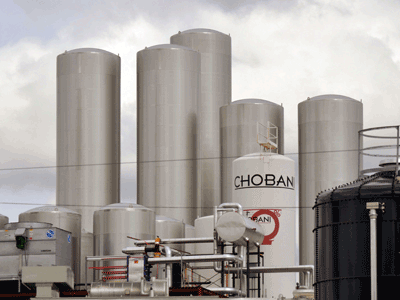Chobani is the brainchild of Hamdi Ulukaya, a Turkish immigrant who recognized the promise held in the yogurt market and risked everything in its pursuit.

In 2005, Ulukaya was in the fourth year of running Euphrates Inc., his feta cheese manufacturing startup in Johnstown, N.Y., when he noticed a mailed advertisement for the sale of a Kraft Foods plant. Rebuilt in 1920 after a fire destroyed the original building, the New Berlin, N.Y. facility had aging yogurt production equipment and once employed 55. When Ulukaya toured the 80,000-square-foot building, he decided to buy the plant the very next day.
With an SBA 504 loan, Ulukaya was able to purchase the plant in August 2005. Ulukaya hired five seasoned Kraft employees and spent the rest of the summer covering the outside of the facility with a fresh coat of white paint. Agro Farma started out making private label regular yogurts for other large companies but Ulukaya believed he could make a better yogurt than the competition: "We aimed at people who never liked yogurt. We couldn't blame them because what was available was not what the rest of the world was eating."
The recipe for Chobani is thicker and creamier than regular yogurt, with twice the protein and none of the preservatives and artificial flavors. What's in the yogurt- five live and active cultures, including three probiotics- is as important as what's not, and Agro Farma turned this competitive advantage into the yogurt's slogan, "Nothing But Good."
Existing Greek yogurt lines were most often sold in expensive specialty stores, so Ulukaya marketed his yogurt brand to a wider customer base through mass distribution channels of grocery store chains. After more than a year developing Chobani's trademark taste, in October 2007 Agro Farma's first shipment included five different flavors- blueberry, peach, strawberry, vanilla and plain- sold to a single Long Island grocery store.
With less than 50 employees when Chobani first hit the shelves, Agro Farma has grown to employ 670 today, providing valuable employment opportunities in Chenango County. Agro Farma now has three full-time shifts, with multiple production lines running 20 hours before stopping for cleaning and maintenance for four hours.
Less than four years after launching, the success of Agro Farma is inspirational, with 1.2 million cases of Chobani made weekly. And in spite of working seven days a week, Ulukaya and his team are enjoying the dynamic journey: "A lot of exciting things are happening for the company. If you put your mind to something, put good people around you, and believe, anything is possible. Chobani's story is, for me, if you really try hard, you can do anything," he said.
5.04.2012